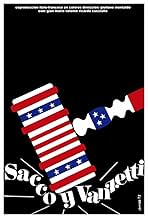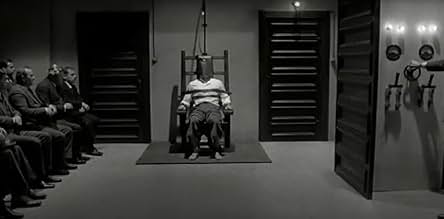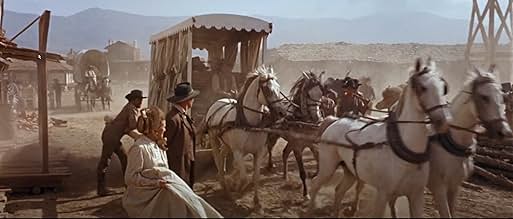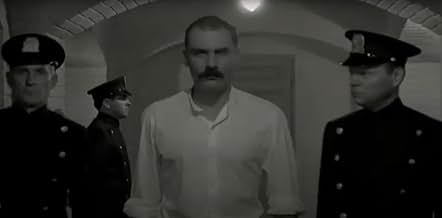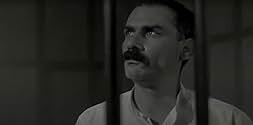La storia di due anarchici che sono stati accusati e ingiustamente processati per omicidio quando la motivazione reale era quella delle loro convinzioni politiche.La storia di due anarchici che sono stati accusati e ingiustamente processati per omicidio quando la motivazione reale era quella delle loro convinzioni politiche.La storia di due anarchici che sono stati accusati e ingiustamente processati per omicidio quando la motivazione reale era quella delle loro convinzioni politiche.
- Regia
- Sceneggiatura
- Star
- Premi
- 6 vittorie e 3 candidature totali
- Defense Board Member
- (as Piero Archisi)
Recensioni in evidenza
Based upon a play and set against a background of the Red Scare, this takes in the arrest, trial and execution of two avowed Italian anarchists for homicide and bank robbery. Neither Sacco nor Vanzetti did themselves any favours by rambling on in the courtroom about radical politics but it is certain that they were the victims of a corrupt police investigation, unreliable and probably intimidated witnesses, questionable ballistics reports and worst of all, a blatantly biased, far Right judge who denied motions for a retrial despite new evidence coming to light that would have exonerted the accused. The Governor of the State appointed a commission to look at the conduct of the trial and it predictably upheld the verdict.
Most of the film has been shot in Dublin which accounts for the presence of Cyril Cusack and Milo O'Shea as counsels for the prosecution and defence whilst Geoffrey Keen looks stern and does a lot of gavel bashing as the infamous Judge Thayer. By all accounts the producers had wanted Yves Montand and Lino Ventura to play the title characters but one could not do better than Riccardo Cucciola and Gian Maria Volonté, the latter well known for his far Left beliefs. Cucciola has the showier role and picked up the awards whilst Volonté's performance is masterfully understated.
The production design by Aurelio Grugnola and Silvano Ippoliti's cinematography give us a real sense of 'being there' whilst the events of seven years, although of necessity merged and truncated, are powerfully presented. Ennio Morricone's score includes a ballad sung by noted activist Joan Baez using the words of Emma Lazarus inscribed on the Statue of Liberty. It is noticeable in the English version that the pro-anarchic sentiments are toned down and interesting to note that the makers have chosen not to feature the Wall Street Bombing of 1920 which killed forty and injured hundreds.
As well as worldwide demonstrations condemning the death sentence, many intellectuals at the time made their feelings plain in print, including Anatole France who likened the process to that of the Dreyfus Affair whilst H. G. Wells wrote: "Trying and executing murderers as Reds and Reds as murderers is a new and frightening line for the court of a State in the most powerful and civilised Union on earth to pursue".
Most powerful? Indisputably. Most civilised? Doubtfully.
This movie is absolutely marvelous, both for construction, acting and story: it recalls the true story of 2 Italian anarchists (Sacco and Vanzetti) sentenced to death by the court in the USA in the thirties because accused to have murdered someone during a robbery. At the time the story had great impact in the people all over the world, because the evidence of their innocence was total, and in many countries there were demonstrations against such terrible injustice. Now it is only another (admitted) mistake by the US justice system... so sad nothing changed ever since... Great was also the soundtrack by Italian maestro Ennio Morricone, sung by Joan Beaz and Georges Moustaki. I doubt this movie passes in the US TV schedules (especially with nowadays local admin.), so, if you want to see a really good movie, rent it out!
Great films are, very often, a means of conveying ideas, and, as Pudovkin once said, film is the greatest teacher because it reaches us both through the head and the emotions. Maybe this is why politically correct authoritarians are always chiding us `not to be sentimental' since emotions are something these control freaks can't orchestrate!
Whatever one's views about the political sympathies of Sacco and Vanzetti, this film shows that they were victims of the hysterical climate of the times and place in which they found themselves, and their plight is represented with great humanism, empathy and power, helped in no small measure by the superb musical score of Ennio Morricone, which must rank as one of his very best. Montaldo's whole technique is thoroughly cinematic, and the acting and all technical credits are faultless.
One somewhat disturbing aspect of this film however, was when I saw it in the USA, Sacco in his final speech from the dock declared, `We stand here because we are anarchists', (it struck at the time because I never thought I'd live to see the day that such a piece of dialogue would be delivered in a film distributed by MGM!), but, in its only screening in the UK on BBC television, this line was changed to `We stand here because we are radicals'. Hmmm! Not quite the same thing. On two other occasions I have noticed `creative subtitling' on French speaking movies, so maybe we should start a campaign for accurate and faithful subtitles!
A brilliant film, in my all-time top 100, so when is anyone going to issue it on video?
Lo sapevi?
- QuizGiuliano Montaldo in a recent interview declared that the first shot of the Gian Maria Volontè monologue was cut, even if perfect, because one of the smaller players started crying due to the convincing performance.
- Citazioni
Nicola Sacco: You speak of dollars and cents, sir. Let's talk about millions of dollars. If you talk about a manager of industry or the head of a bank who donates money to a university, everybody says, "What a great man he is!" But I have worked thirteen years in this free country, doing what I've been told. I've worked like a slave and I still don't own anything, not a single dollar. Here, all you hear is, "Passport, passport!" But when I went to the consulate to organize my journey back to be repatriated, I didn't even have money to pay for the trip! After thirteen years, I would return to my homeland with nothing, just like I started.
- Curiosità sui creditiThe English-language prints begin with the following text crawl: "On January 2, 1920, U.S. Attorney General Mitchell A. Palmer, together with an army of government agents and anyone else who wanted to take part in "Palmer's Red Raids," launched simultaneous attacks in thirty-three cities across the country. The targets were radical and anarchist headquarters. Windows were smashed, property wrecked and resisters beaten. On the east coast, the raids were centered mostly in Massachusetts and New York. Thousands of chained aliens were marched through the streets of Boston and New York City on their way to Deer Island and Ellis Island for deportation."
- Versioni alternativeThe English version tones down some of the pro-anarchy sentiments of the Italian dub, most notably Bartolomeo Vanzetti's final words. In the English version, he simply says "I am innocent", which the real Vanzetti stated in his speech prior to his execution. In the Italian version, he states "Viva l'anarchia" ("Long live anarchy"), which was in fact spoken by Nicola Sacco.
I più visti
- How long is Sacco & Vanzetti?Powered by Alexa
Dettagli
Botteghino
- Lordo Stati Uniti e Canada
- 185.410 USD
Contribuisci a questa pagina


![Guarda Trailer [OV]](https://m.media-amazon.com/images/M/MV5BNmYwZjMxOWYtM2RmMS00ODU2LTlmNTEtYzY4ODgzMzVkOWRlXkEyXkFqcGdeQXRyYW5zY29kZS13b3JrZmxvdw@@._V1_QL75_UX500_CR0)
